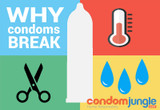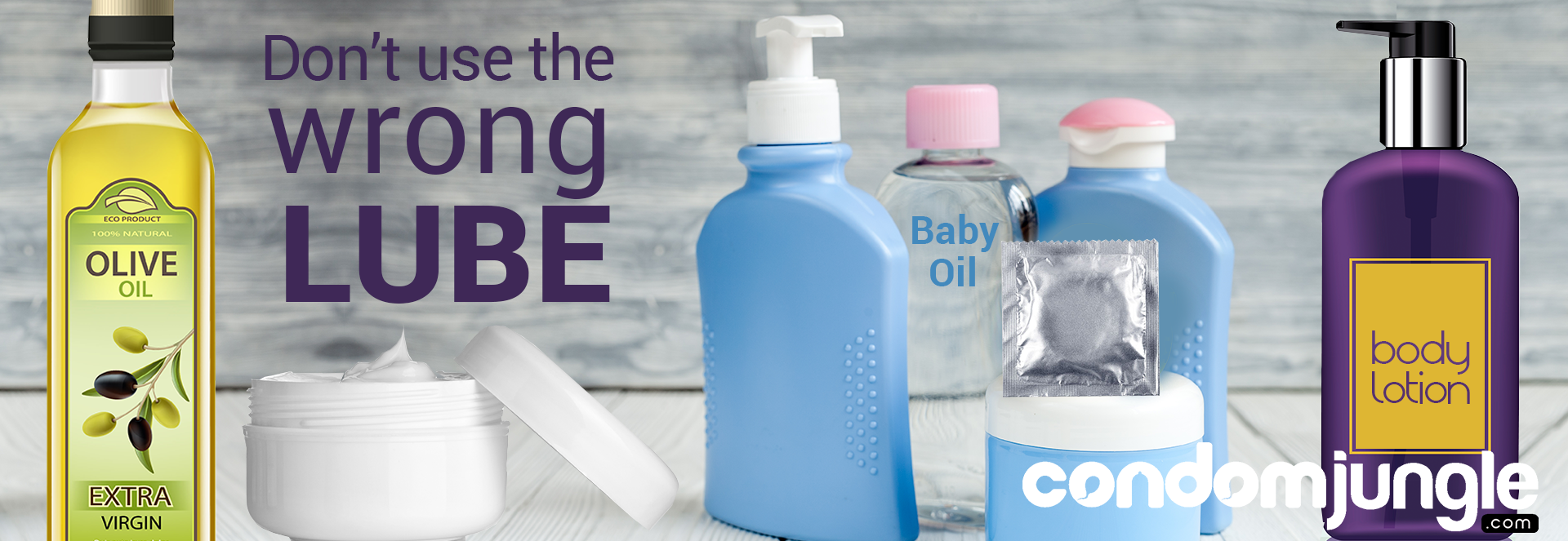Why Do Condoms Break: 11 Common and Surprising Reasons

So, why do condoms break? You never want it to happen, but it’s good to be aware of the reasons so you can hopefully avoid any unexpected mishaps.
Before we go any further, we want to state that condoms are a very reliable form of protection and possible breakage has hardly any correlation with the product quality.
Even though their failure rate is an incredibly low 2%, the list of potential issues is probably a bit longer than you realize. The good news is the power is in your hands. If you learn what contributes to condom breakage, you can prevent most issues.
In this article, we look at the most obvious factors to keep in mind when handling your rubbers -- heat, cold, wrong type of or not enough lubricant, opening the wrapper improperly. Most of it is common sense but it’s always good to learn or have a refresher before opening the wrapper and putting it on.
Why do condoms break?
1. Expiration date
Keep your eye on the expiration date. One of the basic condom facts is that they are perishable. Shelf life, in some cases, affects the level of protection. Their expiration depends on several factors such as the type of material, lubrication, etc., so make sure you always have fresh supplies around.
2. Bad storage
Lousy storage is often one of the leading factors why even relatively new condoms, that have a long way to go before expiring, break. How and, even more specifically, where you store your condoms is essential to their lifespan. So be mindful of extreme temperatures at both ends of the thermometer.
3. Heat
Manufacturers advise that you should not store condoms for prolonged periods in direct sunlight or temperatures above 100ºF. Stashing condoms in your car during summer, or even sort of hot days is not a good idea and not recommended. The prolonged heat weakens the material, which can lead to breakage. High temps also spoil the lubricant sometimes, making it become sticky and, in some cases, even smelly.
4. Cold
Almost the exact case that we just described in the "heat" paragraph also fits a cold environment. Prolonged cold does not pair too well with condoms.
Where to store condoms?
Now that we know that extreme heat and cold don’t make condoms happy, where should you store them? Place them somewhere in your home such as in a closet, nightstand drawer or any dark and dry place. These are typical and ideal places. Don’t forget, if you live in a frigid area or the desert, make sure you keep your condoms at a “normal” room temperature.
Where not to store condoms in your home?
Avoid places like bathrooms where the temperature fluctuates. You take a shower and it's hot, steamy and humid then it gets cold, and it all repeats regularly. This environment is not suitable for perishable products like condoms.
5. Not enough lube
Not enough lube is probably the most common reason why condoms break. Condoms like to slide, and if the sliding gets tough, problems may ensue. Vaginas, when aroused, provide their own lubrication to varying degrees, and the majority of prophylactics come pre-lubricated, but the lube dries out sometimes.
You or your partner's saliva is an excellent natural lubrication when you need it, but it’s always smart to have a condom-compatible lube handy to add as necessary.
6. Dry inside
We just talked about the importance of lubricant. There’s actually even more reason you should have stock readily available. Here’s more on the lube story when it comes to potential breakage…
Most condoms are not lubricated inside, and even those that are don’t always have enough. This may make the skin of your penis feel a bit unpleasant. Plus, when there is not enough movement between the penis and the inside of the condom wall you may experience an “OH, dang, it broke” moment.
Simple solution: Put a drop of a condom-compatible lubricant inside before unrolling the prophylactic onto your penis. This ensures both a higher sensitivity for a better overall feel as well as less chance of breakage.
7. Using the wrong lube
Bet you thought we were done talking about lube…

We don't want to be the messenger of unpleasant news, but deterioration of latex condoms with condoms. Please read the retailer's product page or product packaging after you receive the product because this could easily be one of the top reason why condoms break.
Here's a quick rundown of what not to use as lubrication for your condoms.
What lubes not to use
As you know, condoms are not all the same. Some are latex, some are polyurethane or polyisoprene while others are even lambskin. Regardless of what you have, stay away from oil-based lubes.
Also avoid the urge to use any sort of food product (vegetable oil, olive oil or any other cooking oils), moisturizer or body lotion, baby oil… The list goes on and on, but you get the idea. Not only would these substances weaken the condom material but they don’t pair well with a woman’s private parts.
To be safe, use water or silicone-based lubes only, and as we stated, always check the manufacturer’s packaging or seller's website for the details.
8. Already damaged before use
Another most common reason why condoms break is carrying condoms in your wallet, purse or pants pocket next to your keys exposes them to potential damage such as small punctures or tears. If the condom has already been compromised before using, it could lead to breakage. That’s why it’s so important to be mindful of all the direct and indirect factors.
9. Oral sex
You can use a condom during oral sex. If you plan to move straight to vaginal or anal, you might want to use a new sheath after your oral-pleasuring session. Here is why.

Try as you might, your teeth have a tendency to get in the way. Even the slightest slip may create small punctures and tears in the condom thus making it less effective.
10. Opening the wrapper wrong
Just because you can do something doesn’t mean you should. So as a reminder for opening a condom wrapper, don’t use your teeth, and forget about using scissors, knives, keys or anything sharp like that.
Take care when opening your prophylactics. Gently tear the wrapper open where it’s indicated with your fingers and you’ll be good to go.
11. Buying from online opportunistic sellers
Though this is not a direct reason as to why condoms break, we have to mention it for good measure because it is an issue.
Big online marketplaces are full of opportunistic sellers that want to make quick money selling everything that is available for them to flip. Though these markets try to do their part to make sure their sellers ship their products on time, they have no control over the product quality itself.
Condoms are medical products so you need to store and handle them properly prior to shipping. If the seller operates the business from an overheated garage or storage unit, the rubbers might not be in the best condition.
In addition, there are many counterfeit condoms circulating that these marketplace merchants sell. If you shopped at one of these before, who knows, you might be using a counterfeit tonight.
So next time you are buying condoms think twice and be willing to pay a dollar or two more from a reputable seller for the peace of mind that you are using a genuine product that delivers its top capability.
Bottom line
At the end of the day, human error is a big contributor that impacts condom effectiveness. We hope this article gives you a bit of insight about the main reasons why condoms break and what to do to avoid such an incident, like always having enough lubrication.
No matter what, unless you see there is severe damage, smell something really weird or just know that something is way wrong, it is better to use any condom than to use no rubber at all. It's that simple.
Condoms are cheap so make sure you have a few by your side so you are ready whenever you need them. If you use some common sense, your condoms won’t break and you will be just fine.
